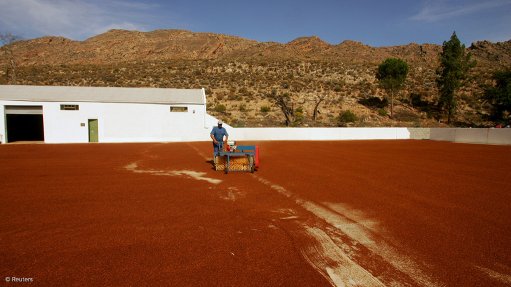
Photo by: Reuters
Rooibos and Honeybush, which are both endemic to South Africa, are among the most widely commercially cultivated botanical species originating in the country, with more than 300 trademarks and 20 patents to their names, which is why they have been singled out as local treasures, according to South African Rooibos Council and Annique CEO Ernest du Toit.
Du Toit and fellow South African Rooibos and Honeybush producers and this week presenting talks on the patents and trademarks of the plant products at the fifty-sixth general assembly of the World Intellectual Property Organisation (WIPO) conference, which kicked off in Geneva, Switzerland, on Monday.
Providing another example of how Rooibos and Honeybush can be applied commercially, Red Dawn IP Holdings, which is owned by beverages companies Audacia Wines and KWV, has developed a method of preserving alcoholic beverages using indigenous Rooibos and Honeybush wood chips, instead of the currently accepted sulphite preservatives.
This innovation by the Stellenbosch-based Audacia is a “huge potential game changer” in the alcoholic beverages industry, given that these toasted wood-chips not only impart flavours on a wide range of beverage types, including wine, beer and cider, but also release antioxidants, which help preserve these beverages, eliminating the use of synthetic preservatives such as sulphites.
Audacia has already created a series of wines that contain no added sulphites or preservatives, as well as low-calorie wines, using this breakthrough technology.
Red Dawn IP Holdings director and Audacia owner Trevor Strydom also lodged patent applications in 83 jurisdictions worldwide to ensure that South African alcoholic beverage producers had the exclusive mandate to create wine, beer and cider using indigenous Rooibos and Honeybush materials in varying forms.
He noted that safeguarding these local resources was crucial to developing jobs and businesses and to sustain a vibrant economy.
“Patent protection and trademark registration of our products is particularly significant given that the European Union finally recognised both Rooibos and Honeybush as geographic indicators in 2014,” said Strydom, adding that South Africa and its local manufacturers, therefore, enjoyed exclusive ownership of Rooibos and Honeybush trademarks and intellectual property.
“These names will only be applicable to products that come from South Africa that are officially approved by the Department of Trade and Industry (DTI), guaranteeing quality control,” he said.
The DTI has also since declared Rooibos and Honeybush as prohibited marks under South Africa’s Merchandise Marks Act, making unauthorised use of these product names a criminal offence. Traditional knowledge legislation, which is in line with the Nagoya Protocol, is also currently being promulgated in South Africa.